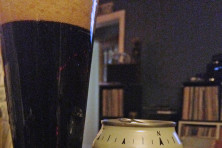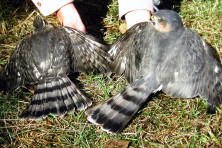Canceled Sharp
- Share
- Tweet
- Pin
- Share
Darren slowly opened the door to his music room. As he had expected, the floor had disappeared. Staff paper, photographs, web pages, texts, loose sheets with scribblings covered the carpet. In the middle of all of that, on the floor, sat Lyla, bending over a large sheet of staff paper that she was rapidly decorating with penciled circles and dots. As always, when she came to stay with him, she had taken over the room.
Darren stepped gingerly over the papers, then stopped to gaze at a black-and-white photograph. It showed a cement wall with a few cracks and a metal tube sticking out. Darren yet again wondered how such things could serve as inspiration for a composer. He knew that Lyla carried in her memory an entire spider’s web of inspirations and influences like these for each work that she had written, but he could only feel completely mystified by it.
He continued crossing this paper garden and folded his chubby body down next to Lyla. She placed a hand on his knee; that was the signal that she was loath to be interrupted. All the same, he hazarded a quick question.
“Not using the laptop?”
“Recharging,” Lyla murmured, and tapped two fingers on his knee.
Darren obediently kept quiet while Lyla added stems to the dots, flags to the stems, lines to corral them all. He glanced from time to time at the sheet, but preferred to watch and admire her fine-featured face and long, deft fingers.
She came to the end of the sheet and lifted into a long, uncurling stretch, like a diva’s gesture. Then she turned to Darren with a soft smile and kissed him lightly. Her eyes were unfocussed.
“I think it’s coming along,” she said, as if in answer to a question.
“Good. Is it the tone poem?” he asked quietly.
She shook her head slightly. “The concert overture. Syracuse wants it for October. Wladek is ‘ailing,’ as they say in the press, and he’s canceling, so Thom is doing the October concert in his place.”
“I hope Wladek’s OK,” he commented.
Lyla sighed. “So do I. He’s a great guy, for a conductor, and he understands me. I’ll miss him.”
She bent back down to her sheet, stared at it for a moment, frowned, and began erasing measures, writing in a few notes, re-erasing, writing again.
“It’s good to see you working,” Darren said quietly. “You’re not fuming over missing the Pulitzer any more, are you?”
Lyla stopped working for a moment, her pencil poised over the paper.
“Um…no…”
She set the pencil point down in an emptied measure. It stood there, immobile. Darren immediately regretted his question.
“It…wasn’t my turn,” Lyla continued. She tilted the pencil and began turning her hand up and down in a determined arc with the pencil point as the pivot. “And…it wasn’t really the right work. That wind quintet is okay, but it couldn’t really compete with Wayne’s concerto.”
Darren was silent. He had been sifting through the possible questions that he could ask about the work that she was preparing, anxious to ask the right one, the one that would lead her into discussing the overture without revealing itself as a ploy. Now he tried desperately to switch over into the search for an unobtrusive, unexaggerated positive comment about the quintet. Before he could find one, Lyla tossed the pencil as if it were a dart. It bounced and plopped onto the paper, a miniature log damming the flow of staves.
“But I wish I could get my hands on the fool who nominated me.”
Darren felt a tingling along his cheekbones.
“Um, why?”
“’Cause I’d like to kick the stuffing out of him,” she answered and cuddled her knees in her arms. “Of all the stupid things to do.”
The tingling accelerated.
“But, sweets, your compositions are great, they’re alive, they’re – ”
“They’re not ready for a Pulitzer, and that one wasn’t good enough. Why people can’t let me decide when I’m ready for something like that…”
“Well, they meant it as a surprise.”
“Some crap surprise. I don’t need humiliation; I find enough of it every day. I lost a commission to Hansen last month, I wasn’t asked back to teach for the summer festival, the critics tore up ‘Urban Moments’…I get enough of that without some ignoramus adding to it.”
It broke out of Darren in spite of him. “I’m sorry.”
“It’s not your fault,” Lyla mumbled. She looked up at him, mouth open, but when she saw his face her eyes went from apologetic to shocked.
“It was you!?”
“I thought it would help you –”
“You call that help!?” Her voice blasted out, ten times the size of her reed-thin body.
“To cement your reputation – ”
“As a useless, no-talent waste of paper? As a loser who doesn’t know enough to get a real job? Why do you have to meddle with my works? Why do you have to interfere with my career?”
“I thought you could travel less…”
“I travel, I hustle, to get my stuff sold and played,” Lyla barked. “Why would I travel less? What would I do if I traveled less?”
“Stay here more,” Darren answered shyly.
“So I’m supposed to play housewife instead of have a career? You feel it’s that useless? You about to whip out the little ring box or something?”
“Darling, please – ”
“Don’t ‘darling’ me, you creep. Don’t mess with my work. Don’t even try to talk to me about it.”
She glowered. He flinched, as if she had already hit him.
“Isn’t it enough that I had to reconstruct my flute sonata after you spilled coffee on it? Isn’t it enough that I missed out on an offer because your damn antiquated answering machine didn’t work?”
Her voice lowered. It sounded even more menacing to Darren.
“Isn’t it enough that I can never work here without you coming in and breaking my concentration? Or that you have to try playing every note I write on your damn viola? Do you really need to destroy everything?”
“I want to help, sugar,” Darren said in a whine.
She grabbed the sheets of score paper that were lying in front of her.
“Why don’t you just do this one in now, while you’re at it?” she screamed, shaking them in his face. Darren instinctively held a hand up. She yanked the paper away from him.
“I don’t need you to wreck things! I can do it myself!”
Lyla tore the sheets savagely into several pieces. Then she threw them into the air, launched herself to her feet, and stomped out of the room, slipping once on a stray piece of notebook paper. Darren sat very still and looked at the floor. The shreds of score sheets slowly wafted down to the floor to join the paraphernalia already scattered on it.
Maude Larke has come back to her own writing after working in the American, English and French university systems, analyzing others’ texts and films. She has also returned to the classical music world as an ardent amateur, after fifteen years of piano and voice in her youth. Larke’s work has appeared in various publications including Bird’s Eye reView, Naugatuck River Review, Cyclamens and Swords, riverbabble, Doorknobs & BodyPaint, Sketchbook, Cliterature, Short, Fast, and Deadly, and The Centrifugal Eye.


